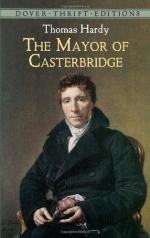This evening motes of straw lay around, and other signs of the premises having been in that lawless condition which accompanies the entry of a new tenant. The house was entirely of stone, and formed an example of dignity without great size. It was not altogether aristocratic, still less consequential, yet the old-fashioned stranger instinctively said “Blood built it, and Wealth enjoys it” however vague his opinions of those accessories might be.
Yet as regards the enjoying it the stranger would have been wrong, for until this very evening, when the new lady had arrived, the house had been empty for a year or two while before that interval its occupancy had been irregular. The reason of its unpopularity was soon made manifest. Some of its rooms overlooked the market-place; and such a prospect from such a house was not considered desirable or seemly by its would-be occupiers.
Elizabeth’s eyes sought the upper rooms, and saw lights there. The lady had obviously arrived. The impression that this woman of comparatively practised manner had made upon the studious girl’s mind was so deep that she enjoyed standing under an opposite archway merely to think that the charming lady was inside the confronting walls, and to wonder what she was doing. Her admiration for the architecture of that front was entirely on account of the inmate it screened. Though for that matter the architecture deserved admiration, or at least study, on its own account. It was Palladian, and like most architecture erected since the Gothic age was a compilation rather than a design. But its reasonableness made it impressive. It was not rich, but rich enough. A timely consciousness of the ultimate vanity of human architecture, no less than of other human things, had prevented artistic superfluity.
Men had still quite recently been going in and out with parcels and packing-cases, rendering the door and hall within like a public thoroughfare. Elizabeth trotted through the open door in the dusk, but becoming alarmed at her own temerity she went quickly out again by another which stood open in the lofty wall of the back court. To her surprise she found herself in one of the little-used alleys of the town. Looking round at the door which had given her egress, by the light of the solitary lamp fixed in the alley, she saw that it was arched and old—older even than the house itself. The door was studded, and the keystone of the arch was a mask. Originally the mask had exhibited a comic leer, as could still be discerned; but generations of Casterbridge boys had thrown stones at the mask, aiming at its open mouth; and the blows thereon had chipped off the lips and jaws as if they had been eaten away by disease. The appearance was so ghastly by the weakly lamp-glimmer that she could not bear to look at it—the first unpleasant feature of her visit.
The position of the queer old door and the odd presence of the leering mask suggested one thing above all others as appertaining to the mansion’s past history—intrigue. By the alley it had been possible to come unseen from all sorts of quarters in the town—the old play-house, the old bull-stake, the old cock-pit, the pool wherein nameless infants had been used to disappear. High-Place Hall could boast of its conveniences undoubtedly.




